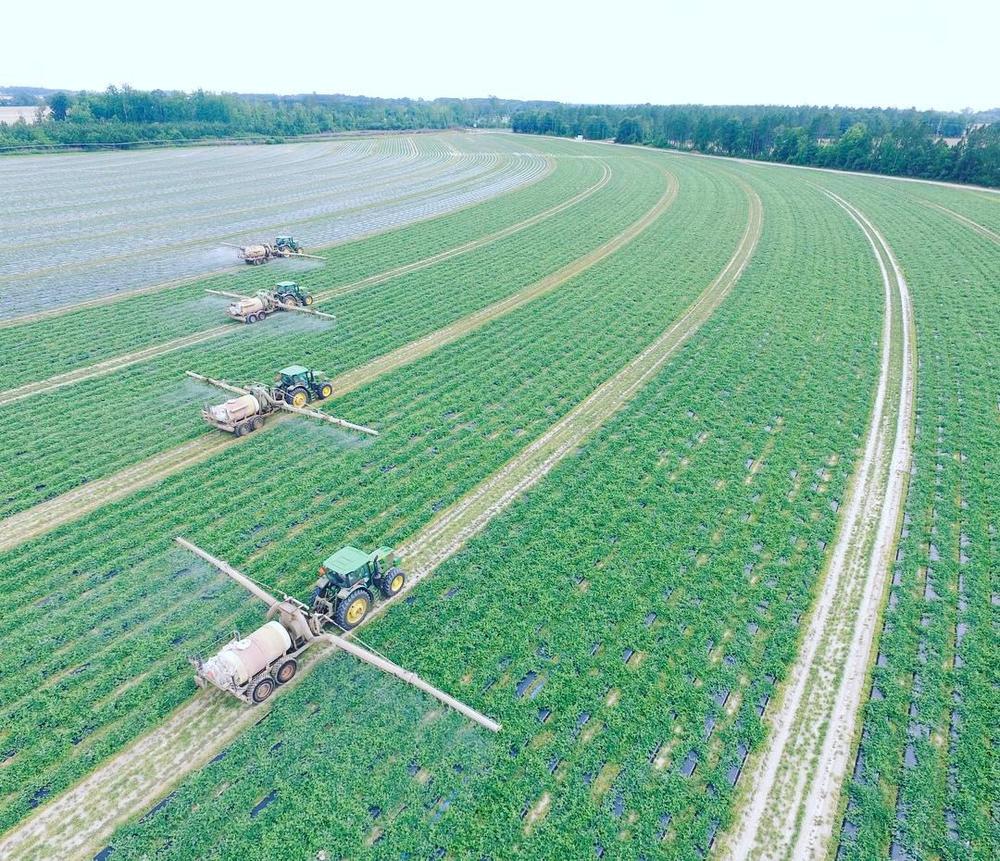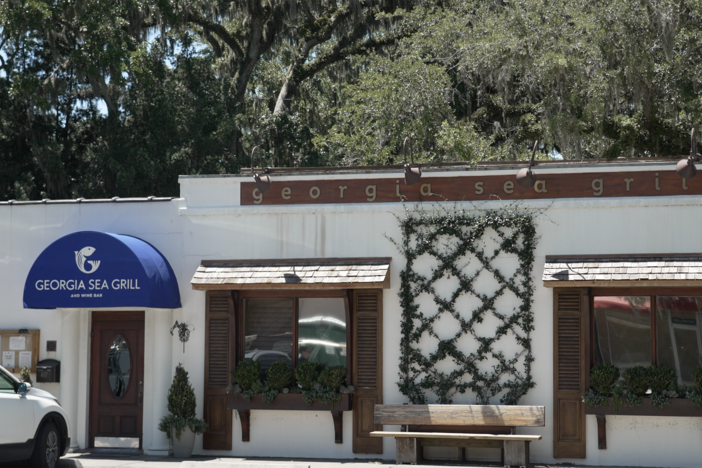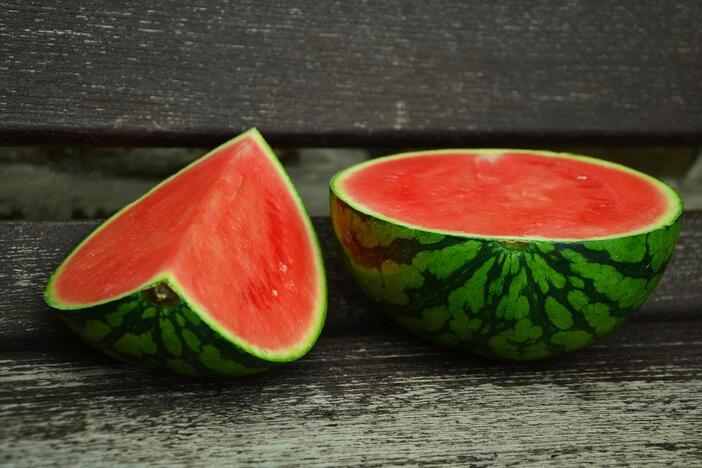
Section Branding
Header Content
A Fork in the Road Podcast: Lewis Taylor Farms
Primary Content
Embark on a journey to the heart of Tifton, Georgia, where the sprawling expanse of Lewis Taylor Farms beckons with its promise of abundance and hard-earned success. Delve into the rich history and thriving present of one of the nation's largest privately owned farms.
Lewis Taylor Farms is a testament to the enduring spirit of family farming and relentless determination. Discover the intricate dance between tradition and innovation as Lewis Taylor Farms harnesses cutting-edge technology and time-tested farming practices to cultivate a diverse array of crops. From bell peppers to cucumbers, squash to watermelons, each harvest represents not only a bounty of fresh produce but also a testament to the unwavering commitment of those who toil tirelessly to feed their communities and beyond.

Bill Brim: One of the people on there asked me about Georgia grown. What was so special about Georgia-grown product? I said, well, first, that it's Georgia-grown. That's why its special. And then I said, you know, it's fresh it's marketable. We're doing it, through our, our Commissioner of Agriculture. And we're — we develop these plans and market strategies and try to help, everybody that works for the Ag department is really devoted to helping us market through Georgia Grown.
David Zelski: Small farms make our agricultural economy what it is. But with hard work and dedication, those farms can grow into something bigger than anyone could imagine. Today we're visiting a big farm with an even bigger amount of work ethic.
Theme Song: I came from the mud, there's dirt on my hands. Strong like a tree, there's roots where I stand.
David Zelski: I'm David Zelski, and this is the Fork in the Road podcast presented by Georgia Grown and the fine folks at Georgia Public Broadcasting. Each episode, we feature stories from Georgia's farmers, fishermen, merchants, artisans, chefs and others who help provide Georgia-grown products to folks in the Peach State and beyond. Today, we're headed south on I-75 to Tifton, Ga. You pass right by Tifton and all the time on your way to the beach. But did you know that it is known as the Friendly City? And Tifton is also a central hub for Georgia agriculture. We're here to visit Lewis Taylor Farms, a sprawling family farm in the heart of the city. Boasting over 6,500 acres of produce a year, 81 greenhouses offering 900,000 square feet of growing space and 80 million pine seedlings, Lewis Taylor Farms is one of the largest privately owned farms in the country. Bill Brim runs the farm with his partner Ed Walker, and this farm has been active for three-quarters of a century.
Bill Brim: Lewis Taylor Farm has been here since the 1950s. I personally, myself, and my partner Ed Walker bought it out in 1985 from my father in law and his father. We are right here in the epicenter of all of our produce. Right here, we got fields all around here that are full of bell pepper, cucumbers, squash, eggplant, tomatoes, cantaloupes, watermelons, you name it. We've got it here. And so right now, we're just in the — right in the crunch of just trying to get real busy and trying to start harvesting everything that we're growing.
David Zelski: The variety of produce grown on Lewis Taylor Farms is staggering. But it means a constant revenue stream. And the farm's impressive greenhouse operation means they're not always at the mercy of the elements.
Bill Brim: When you have multiple varieties, you have an ability to maybe one hitting the market and one not hitting the market. So it gives us a little variability on our pricing and our control over what we're doing. Also, we have a greenhouse operation where we produce all our own plants anyway, so it's pretty easy for us to put our seed in the greenhouse. We're growing them out. We're growing for other customers as well.
David Zelski: And growing produce with the finest Georgia soil means there's always something to pick.
Bill Brim: Well, we just have such a vast array of different ones that we can grow — anywhere from winter crops to spring crops to fall crops. We're growing them all. And we're doing spring pepper. We're doing fall pepper, and we're doing greens and broccoli during the winter time. And the soil is just great soil here to grow in. And it's actually conducive to vegetable production.
David Zelski: Running a produce operation this size takes a lot of hard work from a lot of people.
Bill Brim: We have just an outstanding crew of people that work for us, that are managers and field supervisors. And so it is it all just creates a real good stream of work ethic and everything. Everybody works. We work seven days a week, there's no question about that. But everybody that we have, they don't mind working seven days a week.
David Zelski: Lewis Taylor Farms often employs people through the federal H-2A program, which provides temporary work visas to foreign nationals in order to legally fill certain agricultural jobs.
Bill Brim: We've been doing the H-2A program since 1997. Most everybody, I'd say 90% of the people that we brought in in 1997 are still coming back and forth every year. They really like working here. And, you know, it's better for us because once we bring them in and train them and then we don't have to retrain. They know what they gotta do. Yes. It makes it a lot easier for us as well.
David Zelski: And for members of the younger generation who may be listening. Bill has some words of advice: Come to his farm and he'll put you to work.
Bill Brim: We, we need to teach them how to work. They don't have the work ethic that we — that I have. I work seven days a week, you know, 80 or 90 hours, 100 hours a week, whatever it is, that's what I do. And that's — if you if you find a young kid that really wants to work, he can make a good life with this kind of work in agriculture. But you got to be willing to put your time in and and learn the processes and learn what — what you need to do for promoting and producing. But — but there is there are some great opportunities out here for young kids. I'm looking for kids right now to — to hire to be in our greenhouse operation. I think the kids are great. They just need to learn how that hard work is not going to hurt you. You know?
David Zelski: You heard the man. Turn off the Atari and get your backside down to the farm. Fans of the pepper will find a welcome home at Lewis Taylor Farms. Their wide variety of peppers is marvelous.
David Zelski: Can you name all the varieties of peppers you had?
Bill Brim: Yeah I can.
David Zelski: Let's hear it.
Bill Brim: I have bell pepper, which is a green pepper, and we have a Maximinus, which is a red pepper that turns naturally red. And we have all of the special peppers, yellow sweeties, mini sweets. Anaheim. Jalapeños. Cubanelle, long hots, honkies, serranos, poblanos.
David Zelski: And don't worry, sweets lovers, Lewis Taylor Farms has you covered too.
Bill Brim: Many sweet. And they're just sweet as they can be. They're like candy. Kids love to eat them, you know. And they're good for them, they're nutritional for them. And, they just — they're just so sweet that they bite them off and just chew them because it's not a whole lot of seed in there. It's just — it's just, just a tiny bit of seed, as you can see here. I cut this one open.
David Zelski: So you said they change color, right?
Bill Brim: Oh, yeah. This will this will be either yellow or red. Absolutely.
David Zelski: And for the bold of tongue, there's those peppers which hail from the rough side of the Scoville scale.
Bill Brim: Jalapeño serranos, poblano habaneros. All of those are hot hot hot. And they will bite you. I had a jalapeño for lunch today.
David Zelski: So was it a Lewis Taylor jalapeño?
Bill Brim: It was a Lewis Taylor jalapeño.
David Zelski: Speaking of meals, if you ever believed peppers couldn't be a main course, here's Bill with a dinnertime hunky pepper recipe that will make your mouth water.
Bill Brim: Slice them open in halves, put ground beef and onion then after we cook the ground beef and onions, let it cool then we put cheese in with the onions and the ground beef. And then, what we do, we pack it into the hunky then we take a crescent roll, stretch it and roll it across the top of the hunky all the way down and cover it up completely. And then we put it in the oven at 350 for about 20, 25 minutes till it browns real good and cooks the crescent roll and and the peppers.
David Zelski: Can you say yum? Okay. Sorry. Now, as we stroll through row after row of delicious peppers, I learned about the science and experimentation that goes into growing resilient pepper crops.
Bill Brim: Well, of course, with peppers, disease is always a big problem. We work real closely with the University of Georgia and the Department of Ag in trying to develop new strains. We try to maintain it. We're trying to do all kinds of experimental plots to try to work through these problems that we have.
David Zelski: And the state of Georgia has given Lewis Taylor Farms a great helping hand. They work closely with the Georgia Commissioner of Agriculture.
Bill Brim: But our Commissioner of Agriculture is so dedicated to agriculture that he is — he wants to help us to do whatever we can to make our farms profitable in the state. But he also wants to promote Georgia Grown as well, which is a — is a great product that we use, and a tool. Even I would — I testified on ITC hearing the other day, and —
David Zelski: Quick side note, the ITC is the International Trade Commission.
Bill Brim: One of the people on there asked me about Georgia Grown. What was so special about Georgia Grown product? I said, well, first it's Georgia-grown. That's why it's special. And then I said, you know, it's fresh, it's marketable. We're doing it through our, our commissioner of agriculture. And we're we develop these plans and market strategies and try to help. Everybody that works for the ag department is really devoted to helping us market through Georgia Grown.
David Zelski: Bill also stays up to date on the latest news of his industry through the Georgia Market Bulletin. This is the monthly magazine published by the Georgia Department of Agriculture. Readers of the market bulletin can find thousands of classified ads for livestock, supplies and farm equipment in addition to the latest news on Georgia agriculture.
Bill Brim: We've always been a subscriber to the Market Bulletin. Sometimes, we — we don't get an opportunity to look at it like we'd like to because we're just so busy all the time. I'll generally take it home at night and I'll sit there and read it. But most of everything we're dealing with a little above the market bulletin size. Does a great job for people that are looking for new products, for new ideas and, also able to find a product that they're looking for through the Market Bulletin; maybe a smaller grower that, you know, that's got something that — that's unique to him that we don't have.
David Zelski: Lewis Taylor Farms has seen many improvements in technology over the years, and collaborating with local universities is what made it all possible.
Bill Brim: Oh, I'll tell you, it's been leaps and bounds. I mean, we started out — when we started in 1985, growing produce. We had, we were watering manually. We were trying to take our soil temperature manually. We were doing everything that we could. And unfortunately, at the time we started, the only place that we could get any information was from the University of Florida, because Georgia just didn't have a really good ... program. And that's where we have really stepped up to the plate and devoted our monies in the Commodity Commission to help universities step up and give us some good quality people that will help us to continue to develop and maintain this new technology. We got computer systems on all of our our watering systems now, we inject stuff — our chemicals — into the system. They have check valves on them. Everything is safe. Very safe. And so we're monitoring and doing everything we possibly can to — to make sure that we do do it a safe way, but a productive way.
David Zelski: Technology is wonderful, but most farming still requires a pair of human hands. Sure. Let me see that. Let me see one of those. All right, here we go. Oh. That's awesome.
Bill Brim: It's probably not real sweet yet. It's probably —
David Zelski: I'm hungry though. That's good.
Bill Brim: A few more days and it — When it gets completely red or yellow it's just absolutely outstanding.
David Zelski: When it comes to freshness, buying local instead of imports means fresher quality and supporting your community.
Bill Brim: Well, if you're talking about imports versus us here, our product fresh every day, we get it to the super market, probably in no less than three days after its harvested and cut — goes out of the cooler. Sometimes it's mostly overnight.
David Zelski: And to find Lewis Taylor Farms products in the Southeast, look no further than your local grocery store. Where can people find the Lewis Taylor Farm products?
Bill Brim: Any grocery store in the southeastern United States. You got Publix, you got Kroger's, you've got Piggly Wiggly, you've got, Milo's. We've got all the different grocery chains that we go to and sell to.
David Zelski: Sometimes we see that Lewis Taylor brands, sometimes we don't. Tell me how that all works.
Bill Brim: Well, basically what we do, we contract grow with different growers like Bailey Farms out of North Carolina. We grow a lot of specialty hot peppers for him and BellaFinas that you can see in Publix or Kroger stores, in — in his specific bag, that's Bailey Farms. And then we grow for the commercial market as well. And for other people that don't want to buy already processed, bagged stuff, we can sell it bulk to the chain stores as well.
David Zelski: Traveling through Georgia, I visited many farms. Got to know a lot of farmers that work hard to bring us the food products we enjoy every day, and acquired lots of things to be thankful for. But today, I'm thankful for the pepper.
For more stories like this one, you can watch A Fork in the Road on GPB-TV or any time on the GPB.org website. GPB.org/Podcasts is where you can listen to and subscribe to this podcast or download it on your favorite podcast platform.
I'm David Zelski. Thanks for listening to A Fork in the Road.
A Fork in the Road airs Saturdays at noon and Sundays at 6:30 a.m. on GPB-TV. Check your local listings for other replays throughout the week and watch all episodes anytime at GPB.org/ForkintheRoad. Please download and subscribe to the Fork in the Road podcast at GPB.org/ForkintheRoadpodcast or on your favorite podcast platform as well.

Embark on a journey to the heart of Tifton, Georgia, where the sprawling expanse of Lewis Taylor Farms beckons with its promise of abundance and hard-earned success. Delve into the rich history and thriving present of one of the nation's largest privately owned farms.
Lewis Taylor Farms is a testament to the enduring spirit of family farming and relentless determination. Discover the intricate dance between tradition and innovation as Lewis Taylor Farms harnesses cutting-edge technology and time-tested farming practices to cultivate a diverse array of crops. From bell peppers to cucumbers, squash to watermelons, each harvest represents not only a bounty of fresh produce but also a testament to the unwavering commitment of those who toil tirelessly to feed their communities and beyond.





